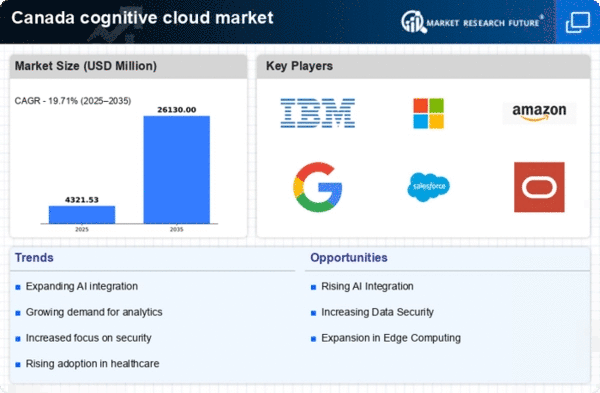Rising Demand for Advanced Analytics
The cognitive cloud market in Canada is experiencing a notable surge in demand for advanced analytics solutions. Organizations are increasingly recognizing the value of data-driven decision-making, which is leading to a greater reliance on cognitive cloud technologies. According to recent estimates, the analytics segment within the cognitive cloud market is projected to grow at a CAGR of approximately 25% over the next five years. This growth is driven by the need for businesses to derive actionable insights from vast amounts of data. As companies seek to enhance operational efficiency and customer engagement, the cognitive cloud market is positioned to play a pivotal role in facilitating these objectives. The integration of machine learning and artificial intelligence into analytics tools further enhances their capabilities, making them indispensable for organizations aiming to maintain a competitive edge.
Emergence of Smart Automation Solutions
The emergence of smart automation solutions is significantly influencing the cognitive cloud market in Canada. Organizations are increasingly adopting automation technologies to streamline operations and reduce costs. The integration of cognitive capabilities into automation tools allows for enhanced decision-making and process optimization. Recent projections indicate that the market for automation solutions within the cognitive cloud sector could reach $5 billion by 2027. This growth is attributed to the rising need for efficiency and productivity across various industries. As businesses seek to automate routine tasks, the cognitive cloud market is likely to provide the necessary infrastructure and tools to facilitate this transition, thereby driving further innovation and operational excellence.
Increased Investment in Cloud Infrastructure
Investment in cloud infrastructure is a critical driver for the cognitive cloud market in Canada. As businesses transition to digital platforms, the demand for robust cloud solutions has intensified. Recent data indicates that Canadian enterprises are expected to allocate over $10 billion to cloud infrastructure by 2026, reflecting a growing commitment to cognitive cloud technologies. This investment is not only aimed at enhancing operational capabilities but also at ensuring scalability and flexibility in business operations. The cognitive cloud market benefits from this trend as organizations seek to leverage cloud-based resources to support advanced cognitive applications. Furthermore, the shift towards cloud-native architectures allows for improved integration of cognitive services, thereby fostering innovation and agility within organizations.
Regulatory Compliance and Data Governance Needs
Regulatory compliance and data governance are becoming paramount concerns for organizations in Canada, thereby impacting the cognitive cloud market. With the increasing complexity of data protection regulations, businesses are compelled to adopt cognitive cloud solutions that ensure compliance and secure data management. Recent analyses indicate that nearly 60% of Canadian companies view compliance as a critical driver for cloud adoption. This trend is fostering the development of cognitive cloud technologies that incorporate advanced security features and governance frameworks. As organizations navigate the regulatory landscape, the cognitive cloud market is likely to evolve to meet these demands, providing solutions that not only enhance compliance but also build trust with customers and stakeholders.
Growing Focus on Customer Experience Enhancement
Enhancing customer experience is becoming increasingly vital for businesses in Canada, driving growth in the cognitive cloud market. Companies are leveraging cognitive technologies to personalize interactions and improve service delivery. Recent surveys suggest that approximately 70% of Canadian businesses prioritize customer experience as a key strategic objective. This focus is leading to the adoption of cognitive cloud solutions that enable real-time data analysis and customer insights. By utilizing these technologies, organizations can tailor their offerings to meet specific customer needs, thereby fostering loyalty and satisfaction. The cognitive cloud market is thus positioned to support businesses in their quest to create more engaging and responsive customer experiences, which is essential in today's competitive landscape.
















